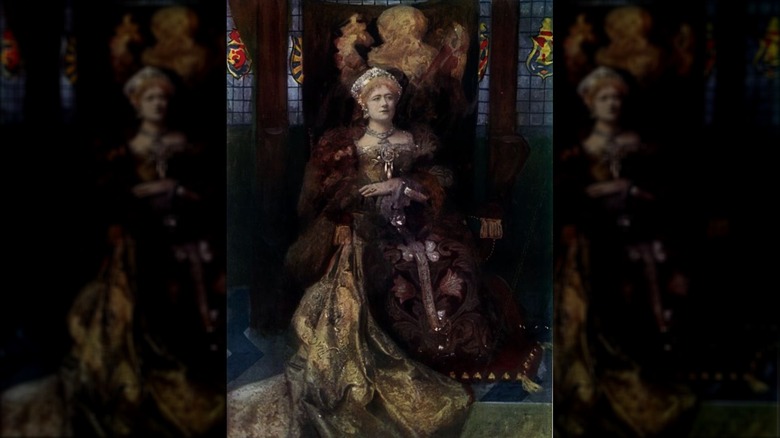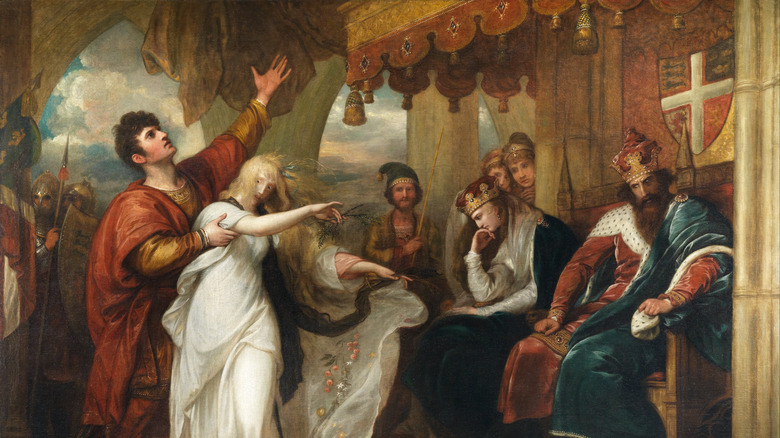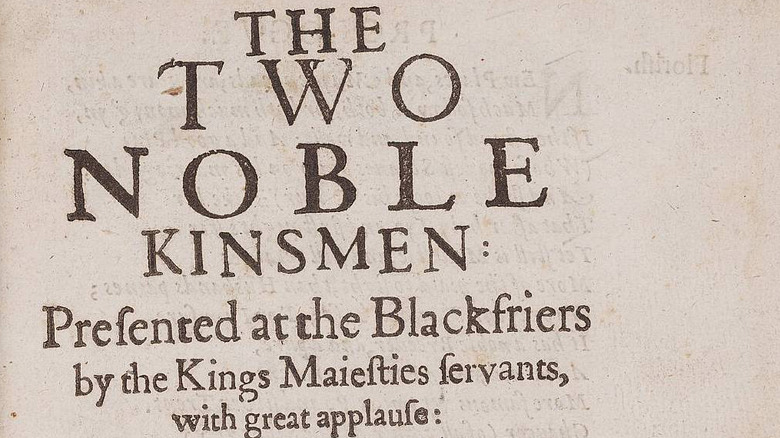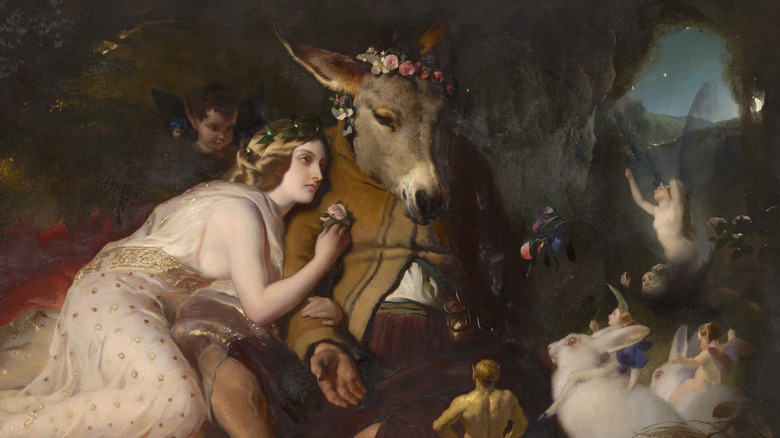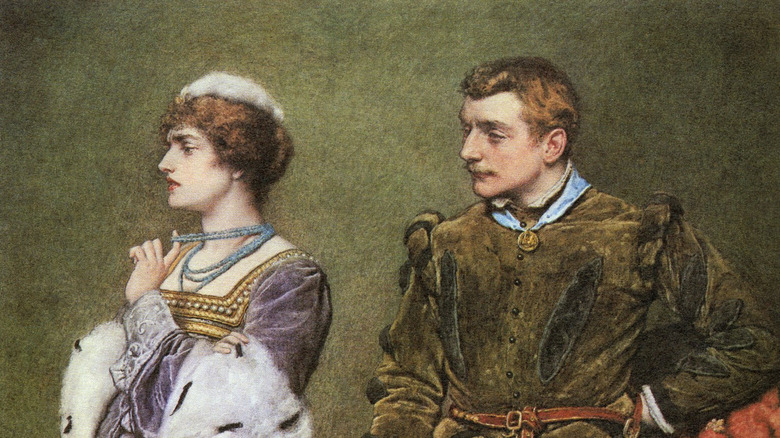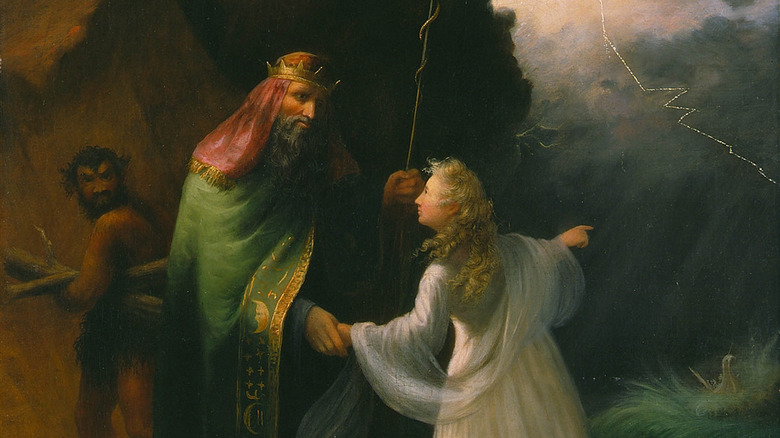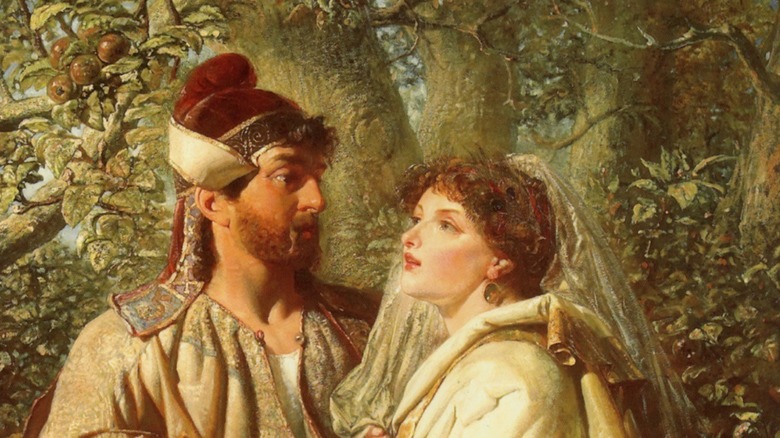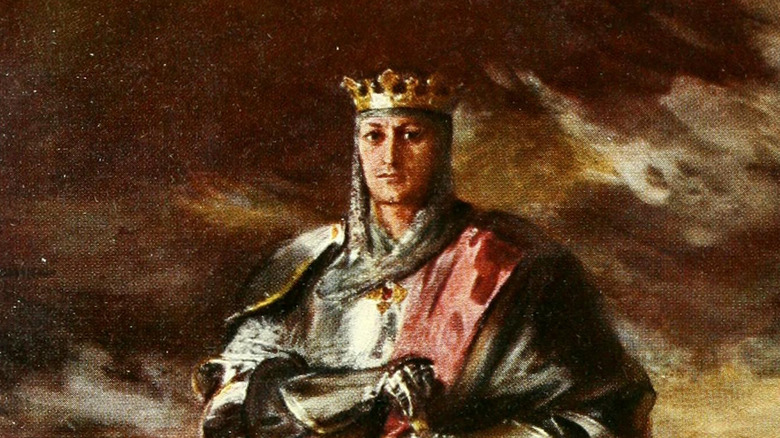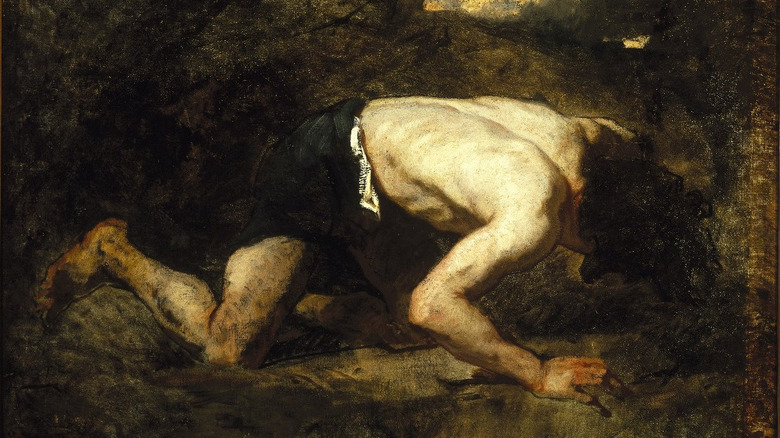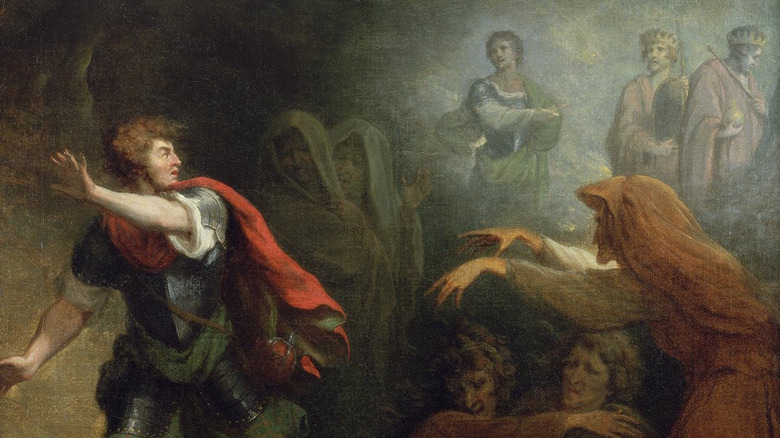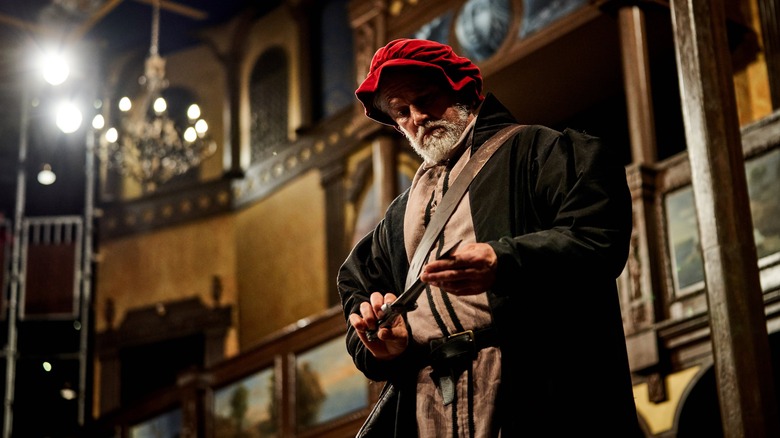The Best And Worst Shakespeare Plays
Want to start an argument? Just walk into any backstage area of a theater near you and start discussing Shakespeare. More specifically, ask about the best plays the Bard wrote ... then inquire about his worst.
To claim that Shakespeare has a few duds to his name is, for some, tantamount to heresy. You can't make your way through a high school English class without coming across one or more of his plays, while there are entire college courses devoted to the study of his works. Many proclaim that he's the absolute best writer the language has ever seen (via BBC). That's pretty good, considering Shakespeare has been dead for over 400 years.
There is good reason to love his work; when Shakespeare is firing on all cylinders, he's a titan capable of moving feats of plot and poetry. But even the MVP of English literature apparently had off days. After all, why would a theatre company go for its millionth production of "Hamlet" when there are plenty of other plays by Shakespeare, like "Troilus and Cressida" or "Timon of Athens?" To get to the bottom of this question, we've come up with some of the best and worst Shakespeare plays, diving into just what makes them great or awful, respectively. While it's certain that you will find something on this list that causes you to shake your head in disagreement, or else wave a rude gesture around at your screen, it's worth considering.
Best: King Lear
Written sometime around 1604, per the Royal Shakespeare Company, "King Lear" focuses on its title character, an 80-year-old king who opens the action by calling for his daughters to proclaim their love for him. In exchange, he'll give them the power of the kingdom. The first two appease the old man's ego, but the youngest, Cordelia, won't stoop so low. Lear goes on a banishing rampage. Things go south as the kingdom crumbles, then get even worse as Lear goes mad and Cordelia perishes. The old king finally dies himself, crushed under his own grief and foolishness.
"King Lear" may be one of the most acclaimed Shakespeare plays today, but it wasn't always so. According to Smithsonian Magazine, theatergoers in 17th-century England hated it so much that they rewrote it. Poet Nahum Tate reworked "Lear" in 1681, forcing a happy ending onto the play and adding a love plot. It wasn't until the 19th century that audiences were ready again for the original.
Those Victorians were on the right track. "King Lear" may be depressing, but that doesn't mean you should pass it by. It's ripe for all sorts of meditations on the nature of aging, mortality, loss of power, and the way in which these forces wash over someone no matter how much they rage.
Worst: Henry VIII
You'd think a story about a king breaking away from the Catholic Church and marrying eight women in succession would be interesting, but you would be wrong. "Henry VIII," written in 1613, is really just Shakespeare yearning for the good old days of Queen Elizabeth (her birth is the climax of the play). It's also not strictly a Shakespeare work. As the Royal Shakespeare Company notes, Henry VIII was co-written with John Fletcher.
The play also has a fairly restricted scope that focuses on King Henry's search for a new wife after the first, Katherine, fails to produce a son and heir. Henry settles on Anne Bullen (the play's analogue for the real Anne Boleyn) to be his new paramour and secretly marries her, per the Folger Shakespeare Library. Given that it also concerns the machinations of Cardinal Wolsey and includes some key deaths, this quasi-historical play should at least be interesting. But, when The Guardian asked why the play doesn't make it to modern stages all that often, the resounding response was that it's just too boring. Though "Henry VIII" has a few defenders, most argue that Shakespeare and Fletcher managed to make the tale of a larger-than-life king and his turbulent love life utterly stultifying.
At least there's some historical interest here. This was the play that saw the original Globe Theatre burn down — a special effects cannon deployed during a 1613 performance caught the roof on fire, according to the Royal Shakespeare Company.
Best: Hamlet
Yes, it's very possible that you were forced to sit through an agonizing group reading of "Hamlet" at some point in high school. Listening to your fellow teens stumble over the now archaic English of Shakespeare probably wasn't the key that unlocked this play for you. "Hamlet" may also be seriously over-saturated in the English-speaking world and beyond, with a dizzying array of film adaptations, stagings, and cultural references that might have you rolling your eyes at the mention of what could be Shakespeare's best-known play. Just hold a prop skull in front of you contemplatively and someone's bound to utter, "Alas, poor Yorick!"
If any of that rings true, it's time to take a step back and appreciate "Hamlet" for what it really is: both a moody meditation on mortality and a bloody revenge drama. Think Liam Neeson wreaking havoc in a castle but also taking a minute between action scenes to muck around in a graveyard contemplating the inevitability of death. Then you start to get the idea. This is one of those plays that has a bit of everything, from big-idea soliloquies about death, to ghosts, to jokes, to a good, showy sword fight at the end. What's more, as Shakespeare scholar Sir Jonathan Bate told Bell Shakespeare, there's a fundamental appeal to this tale of an indecisive young man who's caught up in a dark situation that's grown beyond his control.
Worst: Two Noble Kinsmen
Some Shakespeare plays are cleverly plotted, or at least have enough of a straightforward story that you can enjoy the beauty of the words without getting bogged down in procedural affairs. Others are a bit of a mess. Take "Two Noble Kinsmen," another play that may have been a collaboration between Shakespeare and John Fletcher, per the Folger Shakespeare Library. With all respect to Mr. Fletcher, maybe it's really his fault that this play is structurally strange and endlessly confusing. Having two duds with your name on them isn't exactly a great reference, anyway.
What's so wrong with "Two Noble Kinsmen?" The plot, according to Britannica, is taken straight from medieval writer Geoffrey Chaucer's "Canterbury Tales." In the Shakespeare/Fletcher play, Athens is at war with Thebes. Two nephews of the Theban king, Palamon and Arcite, are captured and imprisoned. They see Emilia, sister of the Athenian queen, through their prison window. The sight of the beautiful woman causes their friendship to break down. After a convoluted series of events and an increasingly annoying love triangle, Arcite and Palamon fight in a tournament to win Emilia. The stakes are alarmingly high, as the loser is to be executed.
Arcite wins, but then abruptly falls from his horse and dies. Before his last breath, he gives Palamon the go-ahead to marry Emilia — she's apparently okay with this change of plans. Maybe she's as confused as we are by the end of this play.
Best: A Midsummer Night's Dream
While Shakespeare's tragedies contain seriously powerful words about big topics such as death, love, and legacy, we all need a break sometimes. Why not a story about a donkey falling in love with a fairy queen?
The plot of "A Midsummer Night's Dream" is actually quite a bit more complicated, though a donkey-man does get involved. Per the Royal Shakespeare Company, the play centers on the lovesick confusion of four young people: Demetrius, Hermia, Lysander, and Helena. Hermia's father is trying to force her to marry Demetrius, but she wants to marry Lysander. Helena is secretly enamored with Demetrius and tries to win his favor by telling him that Lysander and Hermia are going to elope. They all flee into the forest, which is infested by fairies. The two fairy rulers, Titania and Oberon, are in the midst of an argument that eventually involves not just the young lovers, but a group of amateur actors. One of them, Bottom, is magically transformed into a donkey-headed man and falls in love with Titania. Everything is resolved in the end, as in all of Shakespeare's comedies.
Admittedly, this is another of Shakespeare's works that have been staged over and over, as The Sunday Times notes. If you've been to a Shakespeare festival or have gone through an English course, you've almost certainly experienced this play. Try to put that aside and appreciate the dreamy language and the delightful silliness of the play's plot and characters.
Worst: The Taming of the Shrew
Women in Elizabethan England were routinely depicted as idle, foolish, and morally corrupt, as a graduate thesis for the University of Windsor points out. As such, Shakespeare's work reveals the casual sexism of the time that was often played for laughs.
For modern readers, the most uncomfortable example is likely to be "The Taming of the Shrew." The story, according to the Shakespeare Birthplace Trust, concerns yet another set of young people. Only this time, just two of them are in love. Those would be Lucentio and Bianca, but Bianca isn't allowed to wed until someone marries her angry, acid-tongued older sister, Katherina (the titular "shrew"). Petruccio takes up the challenge and marries Katherina, then proceeds to break her down via various tactics — like denying her food and forbidding her to sleep — until she's willing to follow everything he says.
It's clearly meant to be a wacky relationship comedy, but now it may seem more like Katherina is raging at a patriarchal society, only to be abused by her new husband. Is this a fair take on a centuries-old play? After all, we're analyzing it with a modern mindset, and Shakespeare's work is ripe for reinterpretation. But, as Vox notes, the strongest modern stagings either highlight the awful gender politics or modify them far afield of Shakespeare's original, such as "10 Things I Hate About You" and Cole Porter's "Kiss Me, Kate."
Best: The Tempest
"The Tempest" may seem like one of Shakespeare's more simple plays. Powerful sorcerer Prospero and his daughter Miranda live alone on an island, save for the wild man Caliban and their spirit servant, Ariel. A shipwreck brings newcomers, including estranged family members and prince Ferdinand. After various plots and hijinks, Ferdinand and Miranda pair up, and Prospero repairs his relationship with his family (via Shakespeare Birthplace Trust).
Yet this is one of Shakespeare's most emotionally complex and mature plays. It's also the last known play Shakespeare wrote on his own, per Seattle Shakespeare, and one of his shortest.
"The Tempest" is ripe for interesting staging and interpretations. The figure of Caliban, typically depicted as a non-white "other," has raised the issue of post-colonialism for many decades, as the British Library notes. Gender has also been another interpretive lens applied to the play, ironic given that Miranda is the only definitively female character. Yet, there are the absent female characters of Sycorax, Caliban's witch mother, and Miranda's own mother (via Ohio Valley Shakespeare Conference). Some adaptations also cast a woman as Prospero, like Julie Taymor's 2010 film that starred Helen Mirren as Prospera (via NPR). There, the themes of Prospera's power and what it means to relinquish control of that might come into greater and more painful relief.
Worst: Troilus and Cressida
According to the Shakespeare Birthplace Trust, "Troilus and Cressida" focuses on two lovers caught between the opposing sides of the ancient Trojan War. The Trojan noble Troilus is nuts about Cressida, but she's given over to the Greeks. Troilus sees her with another man in the Greek camp, fails to understand the complications of Cressida's position, and leans hard into the warring. The play ends with plenty of death, but absolutely no resolution as Troilus mourns his love and proclaims his thirst for vengeance.
Oh, you thought you were getting a love story? Think again. As the New York Times notes, this is actually more about war and not starry-eyed romance. This means that those characters, and especially the female lead of Cressida, are mere shadows of what they could have been.
What's more, this play takes forever to read or perform, a runtime that seems all the longer for its dull characters. That's despite the appearance of mythological bigwigs like Achilles and Hector. Even the play's defenders admit that this is a seriously uneven play with a two-dimensional female lead (via Reddit). What's more, per the Shakespeare Birthplace Trust, the play ends with a secondary character lecturing the audience on how awful it is when politics gets in the way of humanity. That cynicism, combined with Cressida's difficult situation and the snooze-inducing plot, make this a tough one to watch.
Best: Henry V
Shakespeare really pulled out all the stops when he wrote what may be one of his best history plays. Written almost 200 years after the events of the real-life 1415 Battle of Agincourt, "Henry V" follows a fictionalized version of the title king as he attempts to invade France (via Royal Shakespeare Company). Just before the pivotal Battle of Agincourt, a disguised Henry wanders amongst his men in their camp. What he hears makes him consider what it means to be a king and leads to the famous St. Crispin's Day speech in which he rallies his troops. The English prevail against the French and Henry marries the French princess Katherine, hopefully ensuring a lasting peace.
Besides that iconic speech, there's still quite a lot to consider in "Henry V." As the Folger Shakespeare Library points out, the ultra-patriotic adaptations of this play have often been edited half to death. The uncut text of the play complicates notions of divine power and kingly leadership, with the suffering soldiers casting serious doubts on Henry's ability to lead. To become a truly effective and beloved king, Henry learns that he must both humble himself and raise up the image of England through speeches and pageantry. It's a complicated take that's seriously engaging for a truly keyed-in audience member.
Worst: Timon of Athens
Some Shakespeare plays are frustrating not just because they're overly simple or lacking in poetry, but because they're full of missed opportunities. "Timon of Athens," written between 1605 and 1608, is one such play. According to Britannica, this is another likely collaboration, this time with Thomas Middleton. Perhaps that's why it's painfully simple and lacks the sort of beautiful language and moral complexity that makes classically-trained actors go wild.
The plot concerns Timon, a generous rich man who loves to put on parties and shower his friends with gifts. But when the money runs out, so too do many of his former best buds. The embittered Timon runs away to live in great poverty in a cave. When he's digging for roots, he miraculously finds gold. Only this time, instead of treating his "friends," he uses the money to fund an invasion of his former home. Eventually, he dies and the invaders take over (via Shakespeare Birthplace Trust). The play ends, and everyone in the audience presumably leaves in a terrible mood.
Best: Macbeth
Striving for power can land you in an endless, miserable cycle of trying to maintain that position. The fictional Scottish king Macbeth certainly found that to be the case in his namesake play. The "Scottish play," as it's sometimes called by superstitious actors, is also quite the spooky ride, full of witches, ghosts, and a bloody final battle.
The plot, per the Folger Shakespeare Library, follows Macbeth as he makes his way from a Scottish lord to king of all the Scots. Only, things start to go south in the very first scene, where he encounters a trio of witches who prophesy that he will be king. The snag is that his friend Banquo will produce the next kings. This leads to paranoia, especially after Macbeth murders the current king at the behest of his wife. He becomes a deeply unpopular ruler who kills Banquo, faces rebellion, witnesses his wife's descent into madness and death, then dies himself at the end.
What makes this play stand out from Shakespeare's less-beloved tragedies and history plays? Like the best of the best, it's got plenty to say about big topics such as the lust for power and the heaviness of an ill-gotten crown. It's also full of poetry, such as in the famous "tomorrow and tomorrow" soliloquy. And, as the Shakespeare Theatre Company notes, the whole thing feels a bit like a scary fever dream, made all the more head-turning by its bloody spectacle, paranormal flourishes, and quickly-moving plot.
Worst: The Merchant of Venice
This is yet another of Shakespeare's plays that can easily tip a conversation from literary round table to table-tipping argument in minutes. It's not that the plot is bad or that there isn't any poetry. Instead, it all comes down to the specter of antisemitism.
If you were to glance over "The Merchant of Venice," you might not see the problems at first. It looks like another series of romantic understandings, centering on the foolish Antonio. He takes out a loan from Shylock, a Jewish lender, to help a friend. When Antonio defaults on the loan, Shylock demands a gruesome "pound of flesh" from him in return. Portia, the play's heroine, disguises herself as a male lawyer and saves Antonio. In the end, everyone's happy, except for Shylock, who not only sees his fortune fall away but must also convert to Christianity (via Shakespeare Birthplace Trust).
Shakespeare apparently wanted us to laugh at Shylock, but it's hard to chuckle at his misfortune after the horrors of the Holocaust. As Smithsonian Magazine reports, scholars are still arguing as to just how casually or intentionally antisemitic Shakespeare was, but modern audience members just can't ignore the ugly side of "The Merchant of Venice."


